- Home
- Joel C. Rosenberg
Israel at War: Inside the Nuclear Showdown With Iran
Israel at War: Inside the Nuclear Showdown With Iran Read online
Visit Tyndale online at www.tyndale.com.
Visit Joel C. Rosenberg’s website at www.joelrosenberg.com.
TYNDALE and Tyndale’s quill logo are registered trademarks of Tyndale House Publishers, Inc.
Israel at War: Inside the Nuclear Showdown with Iran
Copyright © 2012 by Joel C. Rosenberg. All rights reserved.
Cover photograph copyright © Gary Hardman/SXC images. All rights reserved.
Designed by Dean H. Renninger
Unless otherwise indicated, all Scripture quotations are taken from the New American Standard Bible,® copyright © 1960, 1962, 1963, 1968, 1971, 1972, 1973, 1975, 1977, 1995 by The Lockman Foundation. Used by permission.
Scripture quotations marked KJV are taken from the Holy Bible, King James Version.
ISBN 978-1-4143-8375-0 (Apple); ISBN 978-1-4143-8377-4 (ePub); ISBN 978-1-4143-8376-7 (Mobi)
Build: 2012-10-12 08:11:41
Contents
A Note to Readers
Chapter One: The Moment of Decision
Chapter Two: Is Israel Bluffing?
Chapter Three: What Netanyahu Believes
Chapter Four: A Clear and Present Danger
Chapter Five: The Road to War
Chapter Six: The Final Countdown
Chapter Seven: What Does the Future Hold?
Sneak Preview of Damascus Countdown
About the Author
Notes
A Note to Readers
I met Benjamin Netanyahu for the first time on the morning of September 25, 2000. We met at the St. Regis Hotel in New York City. He interviewed me briefly, and then the man who had once served as prime minister of Israel (1996–1999) invited me to serve on a small team of American advisors that would complement his Israeli political team. When I said yes, he led me into an adjoining conference room, where I was introduced to several members of this team. Over the next six hours, we began to develop a plan to put Netanyahu back into power.
In many ways, Netanyahu’s political comeback seemed predestined to me. I recall believing that I had just been hired by a once and future leader of Israel, and while I didn’t agree with Netanyahu on every decision he had made in the past, we largely saw eye to eye, and I considered working for him an honor. I had a front-row seat to the great drama of history unfolding before my eyes.
At the time, there were plenty of politicians and pundits both inside and outside Israel who didn’t think Netanyahu would ever become prime minister again. Many, in fact, were dead set against it. Yet despite the drubbing Netanyahu had taken at the polls in 1999, I felt certain he was going to return for two reasons. First, I believed the Israeli people were going to turn back to Netanyahu for his economic and financial savvy and for his strategic foresight. I believed Israel would benefit from his expertise to help grow the Israeli economy and would need his deep determination to protect the Jewish State from a second Holocaust, should Iran ever get the Bomb. Second, for reasons I could not fully explain in the moment, I believed the hand of God was on him and that the Lord was going to raise him up at a critical moment in the history of the Jewish people—and a prophetic moment at that.
What intrigued me about Netanyahu was that he saw something few other leaders in Israel—or around the world—saw. He understood that while the Israeli-Palestinian conflict was painful and important and historic and truly worthy of being solved in a fair and just way, it was not the primary danger facing Israelis or the rest of the people in the modern Middle East. Rather, he could see that the prospect of Middle Eastern dictators acquiring and using nuclear weapons was the real danger, one that absolutely must be avoided at all costs. Thus, while Netanyahu believed sincere efforts needed to be made by Israeli and world leaders to find peace with the Palestinians, he believed far more attention needed to be paid to dealing with Iraq and Iran.
Stopping Saddam Hussein from getting the Bomb had been a top priority for Netanyahu’s mentor, Prime Minister Menachem Begin. It was Begin who ordered the successful Israeli preemptive air strike against the Osirik nuclear reactor in Iraq on June 7, 1981. The international community—including the Reagan administration—was infuriated by the surprise raid, dubbed “Operation Opera” by the Israel Defense Forces. Critics blasted Begin for threatening to destabilize the Middle East. But Netanyahu knew what Begin knew—that the Middle East was already unstable and that the worst-case scenario was for the Butcher of Baghdad to have weapons of mass destruction.
The world also condemned Begin for taking such huge risks and yet only setting back Saddam’s nuclear program temporarily, not permanently. Such critics were certain Saddam would restart his nuclear program in two or three years. They were convinced Begin had just given Saddam a reason to accelerate, not slow down, his pursuit of the Bomb. Yet both Begin and Netanyahu saw that the critics were wrong. The Israeli attack had actually deeply rattled Saddam and had done far more damage to his nuclear program than first thought. As a result, Saddam was not able to quickly reconstitute his nuclear program. Begin’s decision in 1981 actually bought Israel not just two or three years of security from an Iraqi nuclear weapon, but a full decade.
In 1991, the United States led an international coalition to drive Saddam out of Kuwait and keep Iraq’s offensive military capabilities fully contained. Then, in 2003, the U.S. led another international coalition to oust Saddam from power and shut down any prospect of Iraq’s acquiring or using weapons of mass destruction.
Netanyahu drew several important lessons from these developments.
Sometimes the critics are wrong.
Sometimes an Israeli prime minister must act decisively in defense of his country despite widespread domestic and international criticism.
Sometimes the effort to buy even a few years of additional security through preemptive military action ends up buying more time than anticipated.
Iraq, however, was not Netanyahu’s main concern. Iran was.
In his writings, speeches, and personal conversations, Netanyahu had long made the case that the real, long-term strategic threat to the U.S., Israel, and the security of the world were the mullahs in Tehran, who were trying to annihilate Judeo-Christian civilization in order to build their global Islamic Caliphate. In Iran, Netanyahu saw a new Third Reich rising. In a nation of Holocaust survivors, he was determined to do everything in his power to protect his people.
First, however, he was going to have to get back into power.
That, it turned out, took longer than any of us expected. Netanyahu did not return to high office in the time that I worked for him. To the contrary, as I described in my first nonfiction book, Epicenter, he was effectively blocked from running in early 2001 by his chief political rival, then–Prime Minister Ehud Barak.1 Then he found himself repeatedly prevented from rising through the political ranks as longtime rivals of his—men like Ariel Sharon and Ehud Olmert—ascended ahead of him. During this time, Netanyahu served in various lesser roles, first as Israel’s foreign minister, later as finance minister, and for a season merely as a member of the Knesset, the Israeli parliament, all but exiled from the center of power. All the while, he watched Sharon and Olmert (like Barak before them) focus almost exclusively on giving away land and offering to divide Jerusalem, even while Iranian-backed Hezbollah terrorists were rapidly gaining power in southern Lebanon, Iranian-backed Hamas terrorists were gaining control in Gaza, and the Iranian nuclear threat was growing year by year. Netanyahu was convinced he understood the strategic threats facing Israel far better than his rivals, and he was convinced he knew how to deal effectively with these threats. Indeed, close friends of Netanyahu told me d
uring this period that he believed he had been born for this moment.
On February 10, 2009, Netanyahu’s right-of-center Likud political party was finally swept back into power on a wave of popular support. They increased their position from holding a mere twelve seats in the Knesset to twenty-seven seats and receiving a mandate to form a new coalition government, which they did in short order. On March 31, 2009—nearly ten full years after he had been drummed out of office—Netanyahu was sworn in once again as prime minister of the State of Israel.
Today Netanyahu stands at the epicenter of international attention at the most dangerous moment in the modern history of the Jewish State. In the absence of the U.S. or the international community taking decisive measures to neutralize the rapidly growing Iranian nuclear threat, Netanyahu now faces the most difficult decision of his long and fascinating political and military career. Should he order the IDF into a full-scale, all-out war to neutralize the Iranian threat in the next few days, weeks, or months? Or should he delay, hoping the negotiations and sanctions against Iran will eventually work? Should he wait and hope that the U.S. will take decisive action?
The risks of going to war are enormous. But as Netanyahu sees it, so are the risks of not going to war. What if Israel waits too long? What if Washington continues to hesitate and fails to take action in time to prevent Iran from getting the Bomb? What if the Israeli people wake up one morning to the news that those running Iran now have operational nuclear warheads and both the will and the eagerness to use them to annihilate Israel and hasten the coming of the so-called Islamic messiah known as the Twelfth Imam or the Mahdi? Worse, what if one morning many of the Israeli people never wake up at all because the mullahs in Tehran have—without warning—launched a nuclear strike and wiped out most, if not all, of the Jewish State?
Netanyahu has been warning his country, the U.S., and the world of this very danger since the early 1990s. Now the hour of decision has arrived, and the stakes could not be higher. Only time will tell how he will handle this extraordinary test. I have written this book, in part, to assess the magnitude of the threat and the varied dimensions of this fateful decision. How did we get to this point? How do Netanyahu and his closest advisors perceive the enemy, the timetable, the risks, and the endgame? Who is Benjamin Netanyahu? How will the Israeli leader’s complicated relationship with President Obama affect his assessment of the road ahead? What other personal and historical factors are weighing on his mind as he navigates this crisis? What could be the unintended consequences of a decision to go to war? What’s more, how does the current crisis fit into historical trends in the Middle East, and how could this crisis set the stage for Bible prophecies to come to pass in the years ahead?
This book is based on twelve years of observing the man now responsible for leading Israel through this crisis. During that time, I have tracked his speeches and comments in the media and discussed these issues with him personally. I have also had hundreds of hours of conversations in recent years with other Israeli, American, and Iranian military, intelligence, and political experts who are uniquely qualified to shed light on the drama now unfolding. Among those whose conversations shaped my thinking for this book are:
Benjamin Netanyahu, prime minister of Israel (2009–present and 1996–1999)
Moshe Ya’alon, Israeli vice prime minister (2009–present) and former chief of staff of the Israel Defense Forces (2002–2005)
Uri Lubrani, senior advisor on Iran affairs to Israel’s vice prime minister (2009–present) and former Israeli ambassador to Iran (1973–1978)
Avigdor Lieberman, Israeli foreign minister (2009–present)
Danny Ayalon, Israeli deputy foreign minister (2009–present)
Yaakov Amidror, Israeli national security advisor to Prime Minister Netanyahu (2011–present) and former head of assessment for Israeli military intelligence
Ron Dermer, senior advisor to the Israeli prime minister (2008–present)
Dore Gold, president of the Jerusalem Center for Public Affairs (2000–present), longtime advisor to Netanyahu, former Israeli ambassador to the United Nations (1997–1999), and former senior advisor to Prime Minister Ariel Sharon (2001–2003)
Natan Sharansky, head of the Jewish Agency (2009–present) and former deputy prime minister of Israel (2001–2003)
Porter Goss, former director of the Central Intelligence Agency (2004–2006) and former chairman of the House Permanent Select Committee on Intelligence (1997–2004)
Reza Kahlili, former Iranian Revolutionary Guard Corps officer who became an agent for the CIA, author of A Time to Betray: The Astonishing Double Life of a CIA Agent inside the Revolutionary Guards of Iran
Lieutenant General (ret.) William “Jerry” Boykin, former U.S. deputy undersecretary of defense for intelligence and war fighting (2003–2007), former commander of Delta Force, author of Never Surrender: A Soldier’s Journey to the Crossroads of Faith and Freedom
Some of my sources spoke on the record, some off. While not all of them may agree with the analysis and conclusions found in the pages ahead, I am exceedingly grateful for their valuable time and helpful insights. I have no doubt this book is richer for the assistance they provided.
Joel C. Rosenberg
WASHINGTON, D.C.
OCTOBER 10, 2012
Chapter One
The Moment of Decision
July 18, 2012, was a gorgeous summer day. It was bright and clear, with blue skies, white wispy clouds, and a slight breeze—the perfect day to start a vacation. The charter flight from Tel Aviv landed in the Bulgarian resort town of Burgas at 4:50 p.m. local time. The more than 150 passengers—mostly Israelis but a few other nationalities as well—got off the plane and headed to the baggage claim, joking and laughing, glad to be away from the pressure cooker of the Middle East and finally on a low-cost, low-stress holiday. Nothing seemed amiss.
Waiting for them outside the terminal were several chartered tour buses. Soon the Israelis were double-checking their itineraries, finding which bus they had been assigned to, loading their luggage under the coaches, and climbing aboard. No one noticed the long-haired young man lurking in the shadows, wearing a blue-and-white T-shirt, striped shorts, a baseball cap, and sunglasses and carrying a large, bulky backpack. Even if they had, he didn’t seem threatening. In many ways he looked just like them—young and carefree, glad to be traveling, eager to get away from it all.
But moments before one of the buses—filled with forty-two Israelis—closed its doors and began to pull away, the young man with the backpack approached, tried to board, and then depressed the detonator in his hand. In a blinding flash and a deafening boom, his backpack exploded. A massive, horrific explosion ripped through the bus. The shock wave rocked the entire airport. Shattered glass, shards of molten metal, and burning human body parts flew everywhere. Flames shot out of the shell of the bus. Thick, black smoke poured into the sky and could be seen for miles in every direction.
When the smoke cleared, nearly three dozen Israelis lay terribly wounded, some bleeding profusely and shrieking in pain. Five Israelis lay dead.2 The Bulgarian bus driver was also killed instantly. All that remained of the suicide bomber was his severed head, found hundreds of yards away from the blast.
Among the dead was a pregnant Israeli woman named Kochava Shriki. Her husband, Itzik, was wounded in the blast but survived. “Those evil murderers,” said one of Kochava’s grieving sisters. “She [was] a 42-year-old pregnant woman. . . . They were just going away for a three-day vacation and they had to return in a coffin.” Said another sibling, “She was our little sister. She had no children and got pregnant after four years of treatment. The day she left for the trip, she received the news that she was pregnant.”3
One local government official described the attack as “the largest terrorist attack against Bulgaria in our modern history.”
“All the signs are pointing to Iran,” said Israeli prime minister Benjamin Netanyahu, referring to evidence gathered by Israeli an
d American intelligence agencies. “In the past few months we’ve seen Iran try to target Israelis in Thailand, [India], Georgia, Cyprus and more. . . . The murderous Iranian terror continues to target innocent people. Iranian terror is spreading worldwide. . . . Israel will react to it with force.” Netanyahu noted that the attack came on the eighteenth anniversary of an Iranian-backed terrorist attack on a Jewish center in Buenos Aires, Argentina, that killed eighty-five people and injured hundreds more.4
Iran’s Unanswered War
Make no mistake: Iran is already at war with Israel and with the United States.
Since the dawn of the Islamic Revolution in 1979, when Ayatollah Ruhollah Khomeini and his band of Shia Muslim radicals overthrew the pro-Western shah and came to power in Tehran, the leaders of Iran have declared war on America and “the Zionists.” They have declared America the “Great Satan” and Israel the “Little Satan.” They have called for the annihilation of both. They have encouraged millions of Muslims in Iran and throughout the world to pray and chant, “Death to America! Death to Israel!” They have also built, funded, trained, and armed terrorist organizations to kill Americans and Israelis, seemingly with impunity.
On October 23, 1983, for example, agents of Ayatollah Khomeini used a suicide bomber to plow a truck filled with explosives into the U.S. Marines barracks in Beirut, Lebanon, killing 241 Americans. The attack resulted in “the largest non-nuclear explosion that had ever been detonated on the face of the Earth,” according to a U.S. federal court judge who found the Islamic Republic of Iran guilty of perpetrating the crime. The idea for the attack came from Iran. The funding for the attack came from Iran. The driver of the truck was an Iranian. What’s more, U.S. military intelligence intercepted a message between Tehran and Damascus directing the Iranian ambassador to instruct the leader of the terrorist group “to take a spectacular action against the United States Marines.” The evidence presented in federal court of Iran’s complicity in the Beirut attacks was so clear and compelling that the judge ordered Iran to pay $2.6 billion in damages to the families of the American victims. Yet despite this blatant act of war, the Reagan administration did not go to war against Iran.5

 The Copper Scroll
The Copper Scroll The Auschwitz Escape
The Auschwitz Escape The Last Jihad
The Last Jihad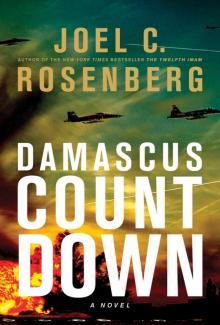 Damascus Countdown
Damascus Countdown The Persian Gamble
The Persian Gamble The Jerusalem Assassin
The Jerusalem Assassin Dead Heat
Dead Heat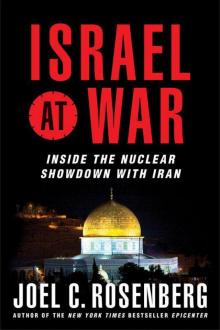 Israel at War: Inside the Nuclear Showdown With Iran
Israel at War: Inside the Nuclear Showdown With Iran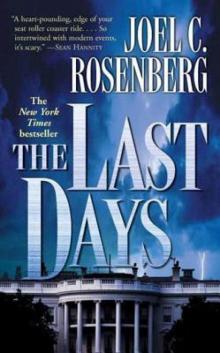 The Last Days
The Last Days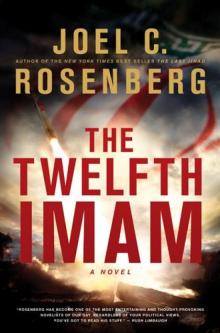 The Twelfth Imam
The Twelfth Imam Epicenter 2.0
Epicenter 2.0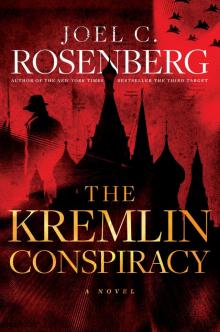 The Kremlin Conspiracy
The Kremlin Conspiracy Implosion: Can America Recover From Its Economic and Spiritual Challenges in Time?
Implosion: Can America Recover From Its Economic and Spiritual Challenges in Time? The Third Target: A J. B. Collins Novel
The Third Target: A J. B. Collins Novel The Tehran Initiative
The Tehran Initiative Inside the Revolution
Inside the Revolution Implosion
Implosion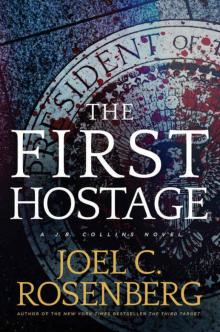 The First Hostage: A J. B. Collins Novel
The First Hostage: A J. B. Collins Novel